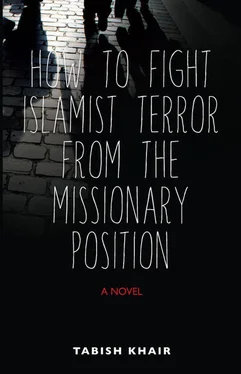Do you remember that in April last year a fundamentalist Christian preacher in USA had “tried,” condemned and burned a copy of the Quran, after a year of infantile posturing back and forth? The news had been covered with surprising restraint by the international media but somehow it had reached fundamentalist Islamic preachers in Afghanistan, who had then led a mob attack on some UN workers, resulting in a number of shocking execution-like deaths. I am sure you will recall that unnecessary tragedy, as good an example as any of how the worst draw sustenance from the equally bad across their over-dramatized chasms.
What you might not recall is that in November a small postscript—almost unreported by the media—had been added to this tragedy. A Pakistani man—a Christian—in a place near Lahore had been (wrongly) considered a relative of the American preacher. Their names, transcribed inaccurately into Urdu, seemed alike. He had been accused of having provided the American preacher with a copy of the Quran to desecrate. A mob had collected, a mullah had pronounced a verdict, and the poor man had been dragged to a field and beheaded. It was, in my book, another example of the kind of Islamist fascism that held much of Pakistan in thrall, largely because liberal Muslims were too busy defending the complexities of Islam from unfair and at times racist Western charges of fascism to be able to face the actual and glaring fact of fascism in Muslim societies.
Strangely, in April, not one of the Friday discussion groups that Ravi attended had brought up the controversy for discussion. Or I would have remembered. Even bin Laden’s dramatic death in May had not been discussed, as far as I could recall, and the “Norway attacks” in July been mentioned only in passing. Why? Well, perhaps because Ali had not attended them, or perhaps because Karim had been more in control. (The other explanation—subterfuge—came to me much later, in the light of other events.) But this Friday in November, the beheading of the Pakistani Christian was mentioned by Ali, who had come over with three other men.
Was Ibrahim there on that occasion? Later, the Danish police officer asked me that question too.
I am not sure. There were four Somali-looking men, but I did not stay in the room long enough to properly observe them. The police officer seemed dubious and shook his head in disappointment when I said so, but it was the truth. Ibrahim might have been there; or perhaps he was not there. I do recall—and I told the officer so—that Ajsa was not in the room. She seldom attended these Friday discussions.
Let me give you a clearer picture of the setting. There was Karim’s sofa-cum-bed in the middle. Usually, Karim would be seated on it, but this Friday he was too restless—he kept going into the kitchen to fetch snacks or brew fresh tea—and as such he had relinquished the sofa to Ali and his cronies. Facing the sofa in a half-circle were six or seven men—I don’t think there was a single woman that evening—on chairs, mostly folding ones. A table with Indian snacks and tea was set in the middle. It also held Karim’s copy of the Quran, wrapped in clean cotton, placed on a wooden pedestal with inlaid silver patterns. Next to the Quran rested Karim’s necklace of beads.
How did the argument escalate? I am not sure; I was reading in the kitchen, not really paying attention to the babble. Suddenly, though, I heard shouting—Karim was in the kitchen brewing more tea—and rushed to the room, followed by Karim. Ali and Ravi were close to hitting each other. Ali always appeared close to hitting someone or the other, even the words he uttered were expelled with a blast, showering his interlocutors with spittle. But it was unusual to find Ravi worked up to that extent; he usually managed to cut people with a comment or a regal gesture. I later realized it had to do with the phase that Ravi’s relationship with Lena had entered, leaving him more vulnerable than I had ever seen him, than—I am sure—he had ever been.
I stepped in and parted the two. Ali left immediately, followed by two of his cronies, shouting. I remember his parting words:
“Anyone who insults the Prophet, peace be upon him, should be killed. It is every Muslim’s duty!”
(The police officer looked very pleased when I reported these words to him.)
Karim apologized to Ravi, but I had had enough and pulled Ravi out of the flat. We were early for our theater appointment—we had agreed to meet the others for a drink in a café—but Ravi did not resist. I asked him what had caused the outburst. What follows is his account.
“The evening was shaping up as these evenings usually do,” said Ravi, as we walked into town. We crossed an election billboard featuring Pia Kjærsgaard and her smile, which, Ravi had claimed in the past, reminded him of a well-fed cat being nice to a juicy mouse. Behind her was emblazoned the legend: Der er en grænse. “There is a limit.” “There is a border.” I think both Ravi and I grimaced at the same time.
Ravi continued: “But then Ali and his cronies referred to this Pakistani Christian who was beheaded. I think Ali was trying to justify the act and also wish it away. You know, bastard, how you bloody mullahs behave when something really bad is done by your fellow Muslims: you look around desperately for the CIA or Mossad or someone else with an agenda to blame it on, and of course half the time those blasted motherfuckers are involved in any case. But then something like this happens, and no amount of Quranic exegesis can dig up a CIA plot. So Ali, poor bugger, had no choice but to defend the crime. I was lost in my own thoughts and did not pay him too much attention, but then he started talking about how all Christians were in the pay of the West and how the West was xenophobic and anti-Islamist. One of the other men objected and said that he did not think that all Danes were xenophobic.”
We paused to allow a sleek, well-groomed white cat to cross the pavement. It did not slink past. It was well-fed and unafraid.
“This is the kind of cat,” said Ravi, “that would give me a taste for mishi kanka.” Then he returned to his account: “I tried to give the matter a half-ironic turn and said something like, ‘I agree: Danes are not xenophobic. It is worse than that. Danes worship the heathen idols of comfort and convenience. Anything, any idea, or person that reduces their comfort or convenience has to be shunned or exorcized. They mostly do not dislike strangers from far places; they simply find them uncomfortable and inconvenient.’ Ali, of course, is incapable of understanding anything like that, and very soon he was shouting about those stupid Danish artists who had made cartoons of your prophet and calling for their death, and for some reason I got provoked… That’s it, let’s forget about Ali. He is a fool and a rabble-rouser.”
“He is a bloody fascist,” I could not help muttering.
“No,” Ravi replied. “He is just a fool and a rabble-rouser. But let’s hasten, good sir, to the café yonder, where we shall say good night till it be morrow.” Then, in keeping with the sudden quasi-Shakespearean turn of his language, he quoted: “Shall we their fond pageant see? Lord, what fools these mortals be!”
At that time, I thought he was still referring to Ali and his ilk. Now, I am certain I was wrong. He was not thinking of Ali anymore. I doubt that he could think of anything other than what was actually troubling him: a glass full of love.
The glass leaked, for the first time, that evening. I had noticed the ripples on its surface in recent weeks, but I had never expected it to leak. Or maybe it did not leak; maybe it brimmed over.
We were in the café, about six of us, including Lena. We were talking of this and that, the usual small talk on such occasions. Lena was the very epitome of poise and grace, so much in control of her speech and gestures that it sometimes appeared as if she were reading out her lines. I think she always made a special effort in Ravi’s presence, tried to be even more perfect than she usually was. I am sure she realized that it was the wrong way to go with Ravi, but she was either too uncompromising or order and poise were too deeply ingrained in her for her to express love in any other way. I think that is what must have set it off.
Читать дальше












